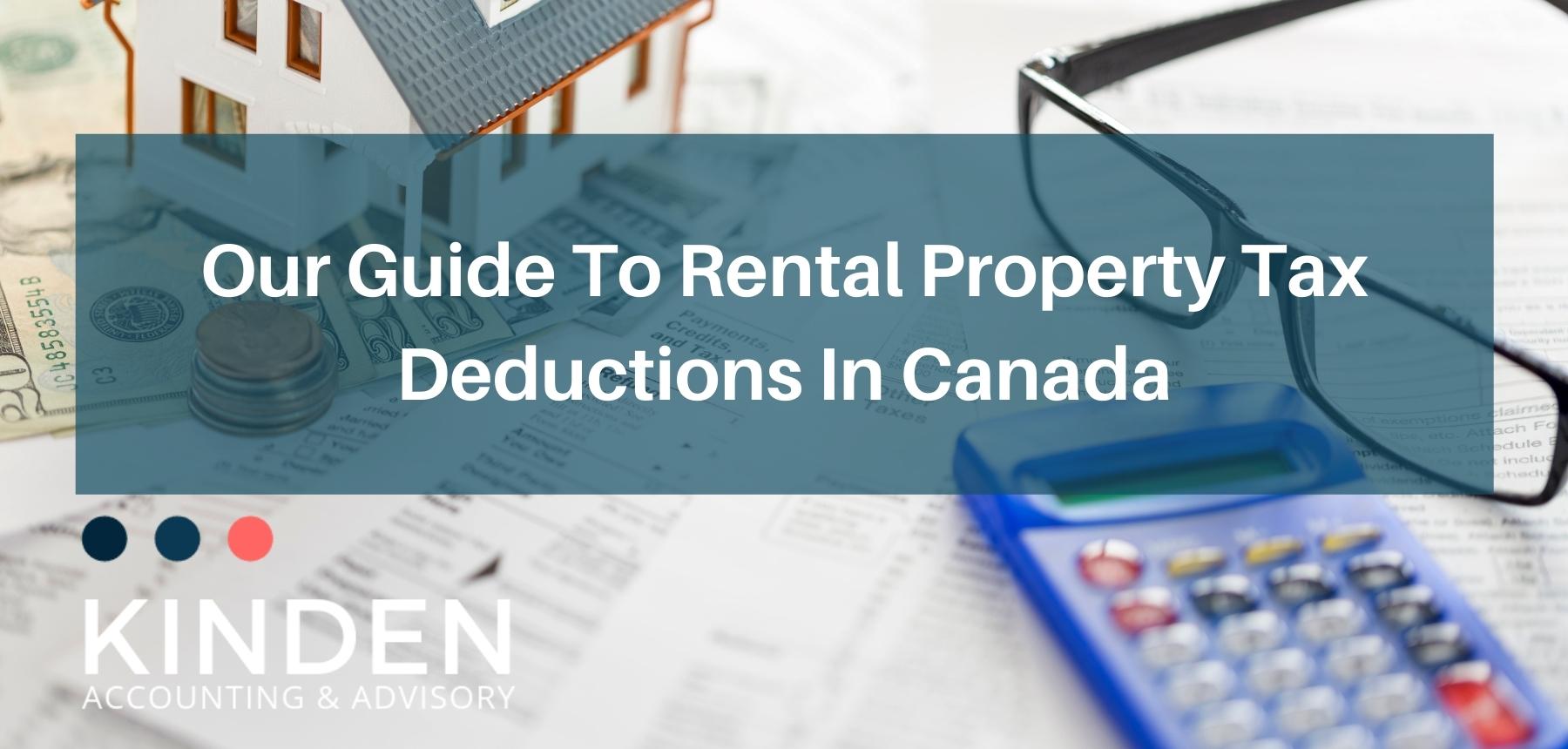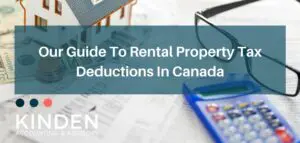
The Canada Revenue Agency (CRA) treats a real estate mogul and the owner of a single rental property much in the same way. Hence, any property owner within Canada receiving rental income must report their earnings to the CRA.
The CRA determines exactly how much tax will be applied to your total rental income. This article is meant to serve as a guide for property owners who have questions about their rental property tax deductions.
Understanding Rental Property Tax Deductions In Canada
Property owners might be wondering, “Do I have to report all the rental income I earn from my property on my tax returns, or can I make deductions from it?” The simple answer is: Yes! You must report all of your rental income because it is taxable.
Fortunately, however, there are many deductions you can make to pay for specific expenses related to your property. We will discuss all of the rental property tax deductions in Canada in further detail later on, but for now, it is important to understand the two distinct categories of expenses acknowledged by the CRA.
Expenses That Qualify For Tax Deductions On Rental Property In Canada
The CRA establishes exactly which expenses can be deducted from your rental income. The CRA also clarifies when during the financial year these deductions must be made. Some expenses are incurred as a one-time deduction in the year the expense was made. Other expenses can qualify as a deductible for several years to come from the year the expense was incurred.
Current VS Capital Expenses
The two basic categories of expenses are current expenses and capital expenses. A current expense is an expense that recurs after some time. The cost to paint the exterior of your wooden property is an example the CRA provides to understand current expenses. You will need to repaint the exterior of your wooden property at some point in time.
Capital expenses provide a long-lasting convenience by adding value to your property. According to the CRA capital expenses are “renovations and expenses that extend the useful life of your property or improve it beyond its original condition”. An example of a capital expense is to place vinyl siding on the exterior wooden walls of a property. The vinyl siding offers a long-lasting convenience to the residents by adding value to the overall worth of the property.
The Canadian Revenue Agency uses the following criteria to distinguish between current and capital expenditures.
- Does the expense pay for a long-lasting benefit?
- Does the expense enhance the property or does it help in keeping the property in a good condition?
- Is the expense for a unique resource or is it a part of the property?
- Is the expense incurred for repairing the property so it can be in a better condition for the residents?
- Is the expense used to repair part of the property solely to sell it?
- What is the intrinsic value of the expense?
The Importance Of The Expense
Are the questions given above a comprehensive list of questions used for determining the type of expense made on a property? Of course not. The Agency’s platform provides many different ways to categorize an expense made on a property. Fully understanding why an expense was made to a property is useful to help make decisions about calculating the expense.
Current expenses made on a property will only apply over a year, specifically the year the current expense was made. Capital expenses, from another point of view, must be broken down distinctly and incurred over more than one year. Rental property owners must be able to comprehend how certain expenses translate into deductions. Making the right deductions based on the expense will ensure that they file their property taxes properly.
A Guide To Rental Property Expenses & Tax Deductions
There is a list of tax deductions on rental property in Canada that property owners can claim at any time. Form T776 used for filing taxes must be completed with all the appropriate information. Let’s look at some of the different types of tax deductions that property owners can avail.
What Can I Write Off On My Rental Property In Canada?
There are several different expenses property owners can write off on their taxes and they can include:
- Advertising
- Home Insurance
- Interest & Bank Charges
- Professional Fees (Legal And Accounting Fees Included)
- Repairs, Maintenance, and Improvements
- Management And Administration Fees
- Motor Vehicle Expenses
- Office Expenses
- Property Taxes
- Travel
- Prepaid Expenses
- Utilities
Let’s look at each one of these categories in detail.
Advertising
Property owners that spend money on advertising on websites, newspapers, and magazines can claim a tax deduction for these expenses. Do not hesitate to claim the full amount of the money spent on advertising because it is purely related to your property becoming a rental property.
Home Insurance
Is your property insured or do you pay insurance premiums for its insurance coverage? You can be entitled to make a deduction for the insurance coverage for the current year if you replied yes to these questions. You will be limited to make your deductions only for the current year if your expenses cover more than one year.
Interest & Bank Charges
There are many different kinds of interest costs you can claim on your property. Topping the list is interest incurred due to taking out a mortgage to buy the rental property. There is no need to include the mortgage principal because it is not deductible. You can also include funds borrowed to finance renovations to your property.
Professional Fees (Legal And Accounting Fees Included)
The costs incurred to hire professionals for specific legal purposes are also deductible. Some of the examples of such fees are attorney fees associated with preparing paperwork related to the rental property. In some cases, you might also be able to deduct accounting expenses if those accounting expenses are related to the auditing, bookkeeping, and financial statements of your property.
Repairs, Maintenance, and Improvements
Try to distinguish between current expenses and capital expenses (as described above) when deducting the cost for the repairs, maintenance, and improvements made to your property. Expenses incurred to repair items to restore them to their original conditions can only be deducted as current expenses for the current year. Funds used to procure new amenities that add value to your property can be calculated as capital expenses that may span over more than a year.
Management And Administration Fees
Management and administration fees include the costs you incurred with real estate agents to help you find new tenants for your property. In some cases, you might be able to include the payments you made to a person or agency to manage your property when you were on vacation. The individual or agency must be in charge of collecting the rent on time and other rental associated services for your property.
Motor Vehicle Expenses
Property owners that have more than one property can apply for deductions of motor vehicle expenses. Single property owners can deduct motor vehicle expenses only if they qualify for certain prerequisites.
Office Expenses
Office equipment, such as paper, pens, pencils, stamps, and stationery, can be included in office expenses only if the office supplies were used for business purposes. Any office supplies you purchase for personal use can not be included in this category.
Property Taxes
Each property has a unique amount of property tax, based on its location, that is collected by the municipality. According to tax rules, you can deduct the property taxes for the current year according to your municipality. Remember to calculate the taxes that apply only to the rented property if you live in a different section of the same property.
Travel
Property owners that also own a vehicle can deduct travel expenses associated with their travel costs if they have more than one property. The traveling costs can be associated with traveling to collect rent if you have multiple properties in different locations. Similarly, property owners that do not own a vehicle can apply for traveling cost deductions based on the costs of public transportation.
Prepaid Expenses
You must pay for some commodities related to your property in advance to receive them at the appropriate time. Any advance payments you have made for any of the facilities in the property you own can qualify as deductions.
Utilities
Utility bills, such as water, heating, and cable, are a major expense for any property owner renting out their property. Luckily, you can place a claim on the tax returns for the utility payments in association with your rental property. This means that you can place a full claim if your entire property is a rental property. It also means that you can only place a partial claim if only a part of your property is a rental property.
Looking for an Online Accounting Firm to Help With your Rental Property Tax Deductions?
If you are looking for an online accounting firm to help with your rental property tax deductions you are not alone. Reputed Accounting firms such as Kinden Accounting & Advisory Services specialize in online consultancy and help you identify the different types of property tax deductions you are eligible for based on your total rental property income.
Professional advice and guidance can help you save money and time so never hesitate to get in touch with an expert.



